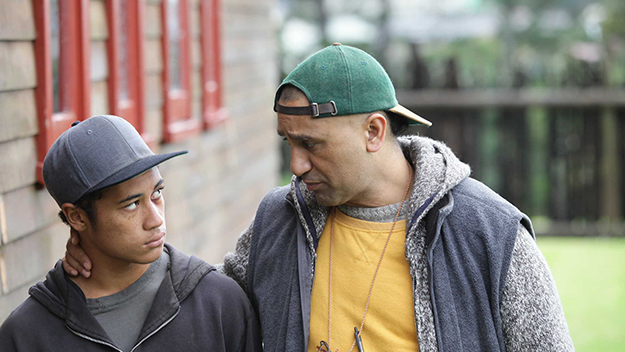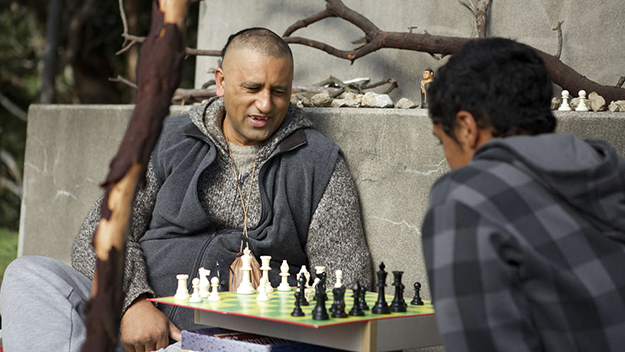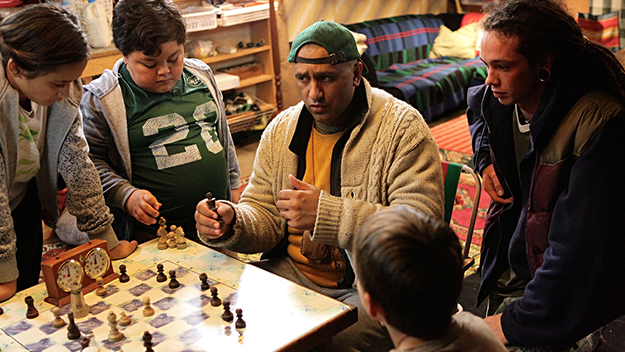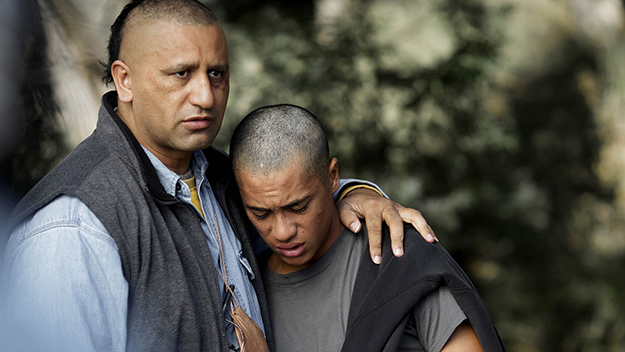Deep Focus: The Dark Horse
The Dark Horse is a rough beauty of a picture. Movies are often called “immersive” when they employ cutting-edge audiovisual technology to overwhelm the audience with sensations. This film’s writer-director, James Napier Robertson, approaches immersion psychologically and contextually. He brings you into the core of his characters and the center of a sociopolitical maelstrom. In the opening scene, his camera follows Genesis Potini (Cliff Curtis)—a mountain of a man draped in a colorful, sodden patchwork—as he walks a Gisborne, New Zealand street in a pounding rainstorm, reciting poetic phrases about light and dark while gesticulating manically yet somehow regally. (Denson Baker did the nimble, unfussy cinematography.) The sight of a chess set in a curio shop seizes his attention. As he enters the store and plays both sides of a game, he tells the chess pieces, “I missed you, my friends.” A sympathetic-seeming woman with an official-looking lanyard around her neck eases him out of the store, as the proprietors assure her he wasn’t being scary or disruptive. She tries to calm him down, only to help two burly male cops shove him into a police van.
The Dark Horse is based on the true story of a Maori speed chess master with bipolar disorder who became an inspirational coach for at-risk Maori children. In the movie, as he strives to stabilize his own life, Genesis engages underprivileged boys and girls—and the audience—imaginatively, intellectually, and viscerally. He was born on September 5, 1963, and died on August 15, 2011. The movie derives from the work he did in the final decade of his life with a Gisborne chess club called “The Eastern Knights.” The film is too vivid and emotionally alive to play like a period piece, yet its tactile, hand-made texture feels like something from a bygone era. Whether because of economic deprivation or cultural lag in the Maori neighborhoods of Gisborne, you don’t see anyone fixated on a computer screen. The success of The Eastern Knights is the opposite of “virtual.” It depends on them meeting regularly and bonding in person—developing their individual skills while devoting themselves to the vitality of the club.
When Genesis was a child, his older brother, Ariki, described chess to him as a war game, then vividly characterized the pieces. That’s what Genesis does for the chess-club kids, too, with wit and ingenuity. He not only says that the King must be protected—after all, the King is the King—but also that the awesome burden of leadership is what makes it so difficult for the King to move. Genesis donates a number of plain, black-and-white chess sets to The Eastern Knights as well as a striking wooden set with sculpted figurines, then asks each member to choose a piece. Genesis’s friend Noble (Kirk Torrance), the founder of the club, selects one for him—“A king for a king,” he says, handing Genesis the monarch. According to Genesis, owning their individual pieces, then regularly restoring them to the board, reaffirms their group identity and strength.
What Genesis’s colleagues and students don’t know is that he desperately needs this validation. His brother Ariki (Wayne Hapi), who recently signed him out of a psych ward, has become a grizzled elder in the Gisborne Vagrants, a violent, criminal Maori leather gang. If Ariki gets his way, his son and Genesis’s nephew, Mana (James Rolleston), will be “patched” into the gang on his imminent 15th birthday. Genesis, armed with medications and advised to avoid stress, does not condone and cannot handle the group’s casual, brutalizing mayhem. Ariki worries that Genesis will be a softening (that is, civilizing) influence on Mana. He tells Genesis to get a place for himself and go on the dole. Instead, Genesis spends the money his brother gives him on those chess sets, then gathers his prescriptions and his crazy quilt and begins sleeping in a park, at the base of a stone monument atop a hill overlooking Gisborne. It’s a picturesque spot—and, as he learns to his regret, a hard place to keep his homelessness a secret.
Without playing a blame game or suggesting panaceas, this movie raises questions about how Western democracies ignore the homeless and the mentally ill and marginalize native people. The director mirrors Genesis’s point of view as he navigates the welter of impressions, words, and feelings that rush at him as he tries to maintain his “positivity.” (The key images include flashes of green flying past car windows.) The biggest threat, though, to Genesis’s well-being is his brother’s gang. At the start, Genesis is desperate for deliverance from the psych ward and thankful that Ariki gets him out. But Ariki views Genesis as a fragile escapist whose prescription drugs conveniently obscure the fang-and-claw truths of the street. Ariki would rather hand his son over for hardening to a frightening, callous gang member named Mutt (Barry Te Hira) than risk Genesis introducing him to a broader world at the National Junior Chess Championship in Auckland. Genesis has vowed to get his club there in six weeks.
The destructive, super-macho Vagrants represent a degradation of the Maori warrior tradition: Mutt tries to toughen Mana up by beating him and urinating on him. Predictably, only one or two women show up at gang headquarters. By contrast, The Eastern Knights are coed, and an adult woman, Sandy (Miriama McDowell), is a prime supporter of Genesis and the club. In addition to being the mother of two members and a den mother to all, she even finds a Genesis a home.
Genesis uses magic tales of the Maori culture hero Maui both to transcend the meanness of daily life and to illustrate chess concepts to children. He compares the fabric of chess moves and countermoves to the device Maui knitted together to snare the sun and to slow its movement across the sky. The film captures the vibrancy as well as the debasement of the Maori legacy. When The Eastern Knights stage a fundraiser to earn money for their trip to Auckland, some perform traditional Maori dances and chants, and one boy tells a story about a wise priest who was exiled to a mountaintop but still managed to save his people from an earthquake. (The analogy to Genesis is perhaps a bit too obvious.)
The Dark Horse is an exhilarating demonstration of a director shaping an entire film around his lead performer. Cliff Curtis, currently playing the trim, sane, intrepid high school English teacher on AMC’s Fear the Walking Dead, packed on scores of pounds to resemble the real-life Genesis. What makes the physical transformation brilliant is the contrast between the heaviness of the character’s gait and the fluidity of his heart and mind. Curtis’s Genesis doesn’t merely swing between mania and depression or convey the tense equilibrium that he achieved with meds. He truly contains multitudes. This movie captures the elation as well as the pathos of Genesis’s childlike optimism and adolescent fervor. When Curtis presents Genesis at the top of his game, he is equally mischievous and wise. When a wayward teenage boy named Michael (Niwa Whatuira) is sent to the chess club after setting fire to a school, Genesis connects with him by turning “burn the school down!” into a cheer. The line turns tragicomic because Genesis, with stress affecting him like Tourette syndrome, can’t resist blurting it out during the final match at the junior chess tournament.
Michael emerges as a natural who can beat Eastern Knights co-founder Noble, no sweat. But Genesis wins Michael’s allegiance by proving he could have beaten Noble half a dozen moves earlier. Whatuira is a wonderful performer; he and Curtis share a funny, touching moment when, in triumph, they clasp each other’s heads and touch noses. Throughout the film, Curtis conveys that Genesis is processing emotional data, not merely having manic episodes, as he paces hyperactively or re-spins conversations he’s just had, in his head and out loud. Curtis is equally impressive when he puts all his kinetic power to straightforward use. He portrays Genesis as a master of call-and-response sermons, though the words he calls for are “Control the center!” and “Connect the rooks!” instead of “Praise the Lord!”
As Mana, Rolleston forges a non-verbal communication with Curtis’s Genesis that is both harrowing and moving. Few contemporary movies depend so crucially on the eloquence of physical chemistry, starting with Mana persuading Genesis that he belongs in the chess club simply by showing up for it repeatedly. Robertson, an actor turned writer-director, knows how to frame his actors and pace their scenes so they reverberate in your memory as the movie goes on. Midway through, Genesis mournfully reminisces about Akiri as a little boy, patting Genesis’s shoulder and telling him “everything’ll be all right.”
In the final scene, Mana and Genesis sit on opposite sides of a van’s front seat, lost in separate thoughts. They’re like Benjamin Braddock and Elaine Robinson at the end of The Graduate, unable to come up with anything to say. Then Mana puts his hand on his uncle’s shoulder. The gesture alone says, “Everything will be all right.”
Michael Sragow is a contributing editor to FILM COMMENT and writes its Deep Focus column. He is a member of the National Society of Film Critics and the Los Angeles Film Critics Association. He also curates “The Moviegoer” at the Library of America website.











